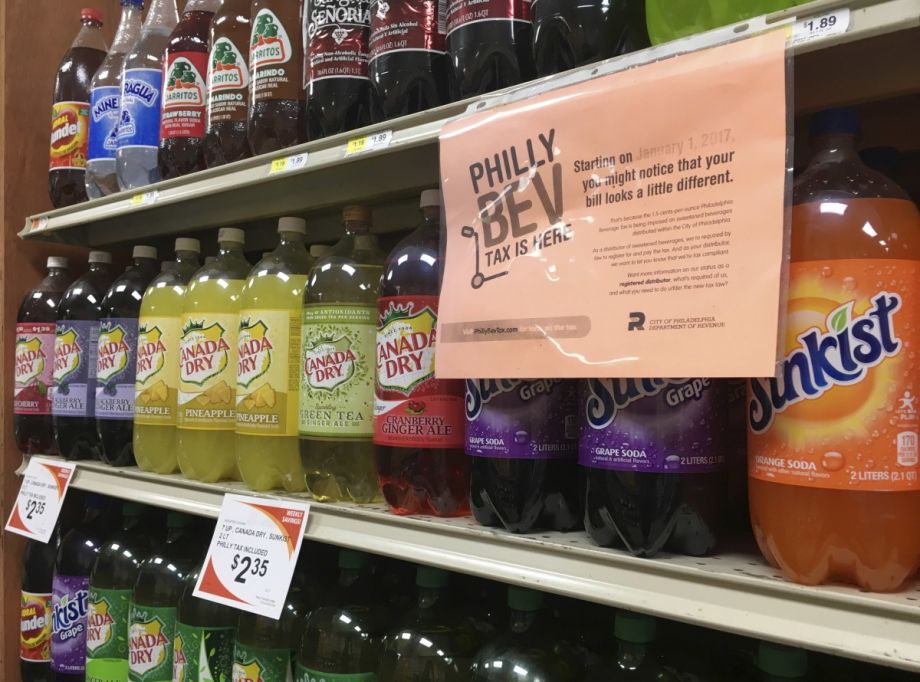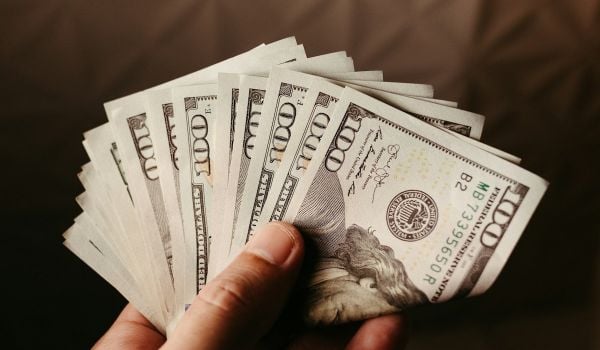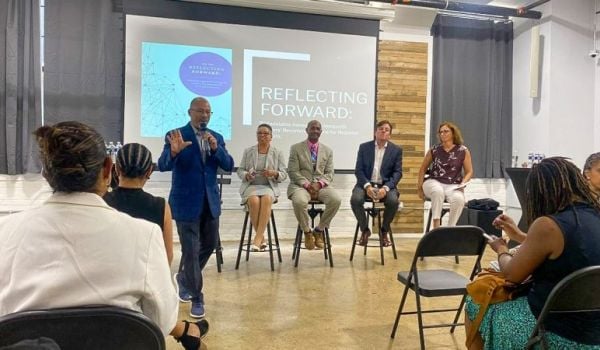It’s been more than a year and a half since Philadelphia’s tax on sugar-sweetened beverages went into effect, and the parade of studies measuring its impacts shows no signs of slowing.
Revenues from the first year of the tax didn’t quite match the city’s projections, according to a story in Billy Penn. A decline in soda sales hadn’t hurt overall business at chain stores in the city as of last year, according to an ongoing study by researchers at Harvard, Penn, and Johns Hopkins. As of April of this year, a Drexel University study suggested that Philadelphians were 40 percent less likely to drink sugary beverages and 58 percent more likely to drink bottled water than their peers in other cities.
Now, a pair of working papers released this month by the National Bureau of Economic Research, report a new set of findings.
The burden of the tax has been fully passed on to consumers, according to a study released last week, with prices rising more in high-poverty neighborhoods and less near the city’s borders.
A second working paper released by the same researchers this week measures impacts on beverage consumption. Shoppers have purchased fewer sugary beverages inside the city and more sugary beverages outside the city since the tax went into effect, the study suggests. Children overall haven’t consumed substantially less sugar from beverages after the tax, it concludes. But children who were drinking roughly one 20-ounce bottle of soda a day before the tax have reduced their sugar intake by 22 percent, and African-American children have consumed an average of eight fewer grams per day of added sugar from beverages.
“I think particularly in terms of the children’s results, these [findings] are really novel,” says David Jones, a senior researcher at Mathematica Policy Research, who co-authored both studies. “We’re the only group to be able to look at children so far.”
Philadelphia adopted its 1.5-cents-per-ounce tax on sugar-sweetened beverages and diet drinks in 2016, during the first year of Mayor Jim Kenney’s administration. Former Mayor Michael Nutter had tried twice to pass a soda tax but was rebuffed both times by the city council. But whereas Nutter had pitched the soda tax as a public-health initiative, Kenney sold it as a way to help pay for a package of major civic investments, including expanded Pre-K and a $500 million effort to rehab the city’s parks, libraries, and recreation centers. But the city is still claiming the reduced consumption of soda as a victory for public health.
“This means Philadelphia residents are responding to the pass-through of the beverage tax in the healthiest way, by switching from sweetened drinks to water,” says Mike Dunn, a spokesman for Kenney, in an email responding to findings from the two latest reports. “This added health benefit would mean a decrease in the number of Philadelphians affected by diabetes and heart disease. Philadelphia has the highest proportion of residents with diabetes of any big city in America.”
Those benefits are in addition to growth in Pre-K, new community schools, and additional impending borrowings for the Rebuild initiative made possible by the tax, Dunn says.
The findings of the first study are based on data the researchers collected around the price of sugar-sweetened beverages and diet drinks in comparable stores in Philadelphia and surrounding Pennsylvania counties. The second study is based on interviews with customers at stores in Philadelphia and surrounding counties, plus a longitudinal study of the drink-consumption habits of a set of consumers the researchers identified before the tax went into effect. In both studies, the researchers matched stores based on the type (corner store vs. grocery, for example) as well as the demographics of the communities they’re located in.
The second study also looked at the frequency of cross-border shopping, concluding that Philadelphians were not substantially more likely to shop outside of the city after the tax, but that when they did shop outside the city, they were more likely to purchased drinks covered by the Philadelphia beverage tax.
Jones says that repeating the study in five or ten years would be even more revealing. People tend to form their consumption habits as children, he says, and it’s possible that children growing up in Philadelphia after the beverage tax will form different habits from earlier generations.
“This study is the longest-term study so far on consumption, but it’s still pretty short-term,” Jones says.
The two papers are part of a larger multi-city study that Jones and his fellow researchers are completing which will also focus on the impact of a soda tax adopted in Oakland, California, in 2016, among other cities. There are important differences between Philadelphia’s beverage tax and those in other cities, Jones says. For one thing, Philadelphia’s tax covers not just sugar-sweetened beverages but diet drinks, unlike most others. And Philadelphia is the largest city with a soda tax in the U.S., meaning fewer residents have an opportunity to easily skip across the border to avoid it than in other places.
“Location does really matter,” Jones says. “If there isn’t too great of a cost, people tend to seek out alternatives, whether it means drinking water, or whether it means going to an untaxed store.”

Jared Brey is Next City's housing correspondent, based in Philadelphia. He is a former staff writer at Philadelphia magazine and PlanPhilly, and his work has appeared in Columbia Journalism Review, Landscape Architecture Magazine, U.S. News & World Report, Philadelphia Weekly, and other publications.
Follow Jared .(JavaScript must be enabled to view this email address)
















